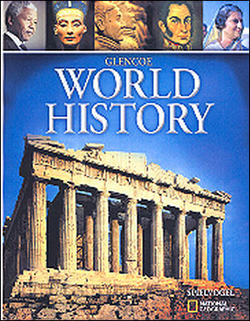Glencoe World History © 2010Chapter 8:
The Asian WorldStudent Web Activity Lesson PlansThe Mongol Dynasty and Kublai Khan Introduction Because the Mongols used force to gain power, one might assume that they relied primarily on force to rule. In this activity students will discover otherwise by reading about the policies and projects of Kublai Khan. Lesson Description
Students will read a Web site about the dynasty of Kublai Khan and the procedures he set in place. While they are reading, students will create a list of 10 of Kublai Khan's policies and projects. After reading the selection, students will answer four questions about what they have read. They will then indicate whether each policy or project they have listed seems designed primarily to benefit Kublai Khan or his subjects. Instructional Objectives - The learner will be able to interpret Kublai Khan's government policies and initiatives.
- The learner will be able to assess Kublai Khan's policies and evaluate their usefulness.
Student Web Activity Answers - The dynasty was named “Yuan,” which means "origin of the universe."
- Kublai Khan filled grain storage facilities so he would be able to provide food for the poor in case of famine. He also fed about 30,000 poor people in the capital daily.
- Kublai Khan organized a fixed, regular tax system. The people did not pay their taxes to the local collectors but made just one payment to the central government.
- There were 1,400 postal stations. Rest stops had hostels with kitchens, main halls, areas for animals, and grain storage facilities. Rider-messengers could cover 250 miles a day.
- The list of policies and projects that students select will vary, as will their responses to the second part of the activity. Policies and projects could range from Kublai Khan's tolerance and respect for various religions to the treatment of the poor and foreigners to setting up a paper currency system. The purpose of the second part of the activity is to encourage students to consider the motivations behind the ruler's decisions. In many cases, they may conclude that Kublai Khan was motivated both by a desire to improve the conditions of his subjects and to protect his own power.
 | 
















